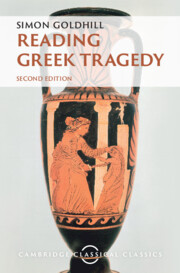Book contents
- Reading Greek Tragedy
- Cambridge Classical Classics
- Reading Greek Tragedy
- Copyright page
- Dedication
- Epigraph
- Contents
- Preface
- Preface to Second Printing
- Re-Reading Reading Greek Tragedy
- Chapter 1 The Drama of Logos
- Chapter 2 The Language of Appropriation
- Chapter 3 The City of Words
- Chapter 4 Relations and Relationships
- Chapter 5 Sexuality and Difference
- Chapter 6 Text and Tradition
- Chapter 7 Mind and Madness
- Chapter 8 Blindness and Insight
- Chapter 9 Sophistry, Philosophy, Rhetoric
- Chapter 10 Genre and Transgression
- Chapter 11 Performance and Performability
- Bibliography
- Index
Chapter 8 - Blindness and Insight
Published online by Cambridge University Press: 19 October 2023
- Reading Greek Tragedy
- Cambridge Classical Classics
- Reading Greek Tragedy
- Copyright page
- Dedication
- Epigraph
- Contents
- Preface
- Preface to Second Printing
- Re-Reading Reading Greek Tragedy
- Chapter 1 The Drama of Logos
- Chapter 2 The Language of Appropriation
- Chapter 3 The City of Words
- Chapter 4 Relations and Relationships
- Chapter 5 Sexuality and Difference
- Chapter 6 Text and Tradition
- Chapter 7 Mind and Madness
- Chapter 8 Blindness and Insight
- Chapter 9 Sophistry, Philosophy, Rhetoric
- Chapter 10 Genre and Transgression
- Chapter 11 Performance and Performability
- Bibliography
- Index
Summary
Throughout the fifth century, Athens provided a focal point for the discussion, dissemination and development of the ideas that make up what has been called the fifth-century enlightenment. Travelling sophists, rhapsodes and teachers and artists of all sorts gravitated to Athens, whose self- proclaimed hegemony was cultural as well as political, and whose society offered the most extensive opportunities for intellectual pursuits. ‘To sum up’ says Pericles in Thucydides,1 ‘I declare our city is an education to Greece’ – a paradigm and a school – and throughout Thucydides’ history the Athenians are explicitly distinguished by their allies and enemies alike for their intellectual originality and precociousness.2 For Herodotus, it is a commonplace that the Athenians are renowned for their intelligence;3 Athens is the prytaneion, the ‘council-chamber’, of the wisdom of Greece4 – the meeting-place for ideas and debate.
- Type
- Chapter
- Information
- Reading Greek Tragedy , pp. 245 - 269Publisher: Cambridge University PressPrint publication year: 2023

